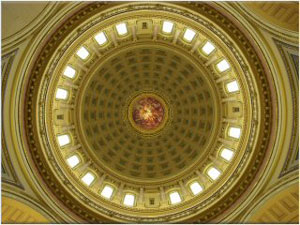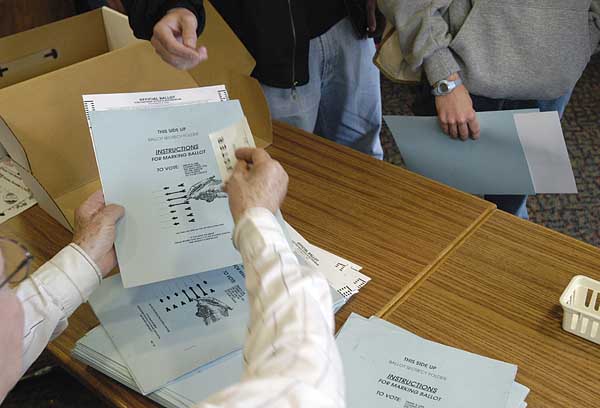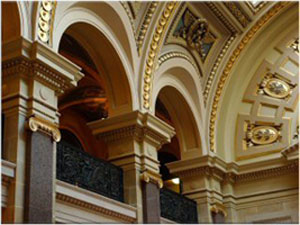 The 2013-14 regular legislative session ended last week and legislators and the governor will shift their focus to the fall elections.
The 2013-14 regular legislative session ended last week and legislators and the governor will shift their focus to the fall elections.
PROFS was very active in the legislative process, meeting with more than a dozen legislators and staff on several issues.
AB 729, a bill that will allow classified research on UW System campuses, was passed by the legislature and awaits the governor’s signature. PROFS registered in favor of this bill.
The governor recently signed many bills into law:
- SB 655, a bill that included many changes to campaign finance laws. Under the new law, lobbyists may make election-year contributions to legislative candidates after April 15. Current law limits such contributions to June 1 or later.
- SB 324, a bill that limits in-person early voting to weekdays from 8 am to 7 pm. Early voting on weekends will not be allowed. The governor vetoed a provision in the bill that would have limited early voting to 45 hours per week.
- AB 202, a bill that would allow election observers as close as three feet from the tables where voters announce their names and addresses before receiving a number to vote.
- SB 300, a bill that would require insurers to cover oral chemotherapy in the same way that intravenous chemotherapy is covered.
- AB 726, a bill that would allow marijuana oil to be used as a treatment for seizure disorders.
Board of Regents
Governor Scott Walker named four new members to the University of Wisconsin System Board of Regents last month. The governor appointed José Delgado and Eve Hall to replace outgoing Regents John Drew and Gary Roberts. Delgado and Hall will serve seven year terms beginning May 1.
Walker appointed UW-Madison student Nicolas Harsy to a two year term, serving as the non-traditional student regent and appointed UW-La Crosse student Anicka Purath to complete the two-year traditional student term being vacated by UW-Platteville student Chad Landes who is graduating in May and leaving the board early.
Fall Elections
Governor Scott Walker will face Democrat Mary Burke in November, and twenty legislators have announced they will retire at the end of their term or pursue higher office.
The following senators have announced they will retire at the end of their term:
- Senator Tim Cullen (D-Janesville)
- Senator Bob Jauch (R-Poplar)
- Senator John Lehman (D-Racine)
- Senator Dale Schultz (R-Richland Center)
The following assembly members will not run again:
- Rep. Penny Bernard Schaber (D-Appleton)
- Rep. Janet Bewley (D-Ashland)
- Rep. Garey Bies (R-Sister Bay)
- Rep. Fred Clark (D-Baraboo)
- Rep. Mike Endsley (R-Sheboygan)
- Rep. Dean Kaufert (R-Neenah)
- Rep. Steve Kestell (R-Elkhart Lake)
- Rep. John Klenke (R-Green Bay)
- Rep. Bill Kramer (R-Waukesha)
- Rep. Dan LeMahieu (R-Cascade)
- Rep. Howard Marklein (R-Spring Green)
- Rep. Sandy Pasch (D-Shorewood)
- Rep. Jon Richards (D-Milwaukee)
- Rep. Janis Ringhand (D-Evansville)
- Rep. Pat Strachota (R-West Bend)
- Rep. Erik Severson (R-Osceola)
- Rep. Mary Williams (R-Medford)




 The Legislature remains in session until April 3, and both houses have been meeting to wrap up pending legislation before the summer recess.
The Legislature remains in session until April 3, and both houses have been meeting to wrap up pending legislation before the summer recess.